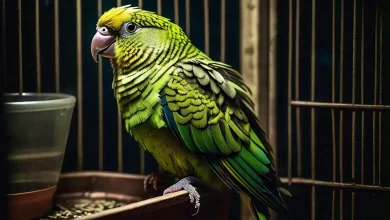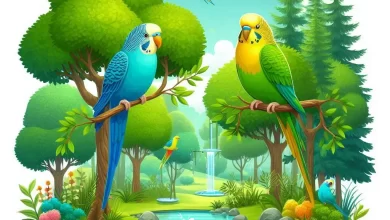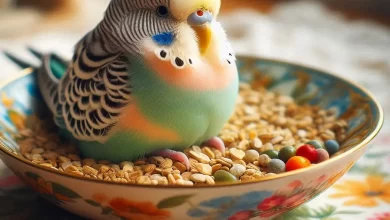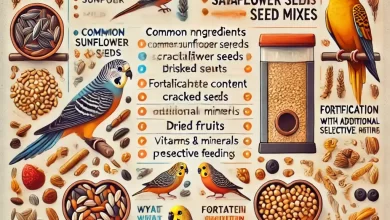Do Parakeets Need Grit? A Comprehensive Guide for Bird Owners
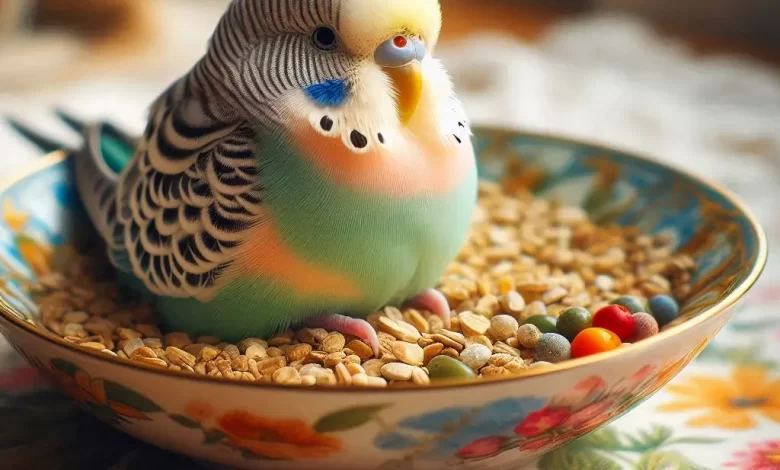
Parakeet owners often ponder a crucial question about their feathered friends’ diet: do parakeets need grit? This small yet significant aspect of parakeet care can significantly impact your bird’s digestive health and overall well-being. As we delve into this topic, we’ll explore the intricacies of parakeet nutrition and uncover expert insights on the role of grit in avian digestion.
Grit, typically composed of small, insoluble particles like fine sand or crushed shells, has long been debated in pet bird care. Traditionally, it was thought essential for all birds, including parakeets, to aid in grinding food in their gizzards. However, modern avian nutrition research has shed new light on this practice, particularly for pet parakeets whose diets differ significantly from their wild counterparts.
Understanding your parakeet’s digestive system is critical to making informed decisions about their diet. Unlike some other pet birds, parakeets have a unique gastrointestinal tract that’s adapted to their natural eating habits. This guide will answer whether parakeets need grit and provide comprehensive information on parakeet diet essentials, potential digestive issues, and how to ensure your feathered companion receives optimal nutrition.
As we explore this topic, we’ll consider both wild and domesticated parakeet diets, examine alternatives to grit, and discuss how to prevent nutritional problems in parakeets. Whether you’re a new parakeet owner or an experienced bird enthusiast, this article will equip you with the knowledge to make the best dietary choices for your pet.
Join us as we unravel the mysteries of parakeet digestion and navigate the sometimes confusing world of bird nutrition. By the end of this guide, you’ll clearly understand whether grit is necessary for your parakeet and how to provide the best possible care for your feathered friend.
Understanding Grit and Parakeet Digestion
To fully grasp the debate surrounding grit for parakeets, it’s essential to understand what grit is and how it relates to a parakeet’s unique digestive system.
What is Grit?
Grit refers to small, hard particles that some birds ingest to aid digestion. In the wild, birds might consume tiny pebbles or sand. Commercial grit products are available for pet birds and are typically made from crushed oyster shells, limestone, or other mineral sources. There are two main types of grit:
- Insoluble grit: This type remains in the gizzard and helps grind food.
- Soluble grit: Made from materials like oyster shells, this type dissolves and provides calcium.
The Parakeet Digestive System
Like other birds, parakeets have a distinctive digestive tract that differs from mammals. Here’s a brief overview:
- Beak: The first step in digestion. Parakeets use their beaks to crack seeds and manipulate food.
- Crop: A storage pouch holding food before moving to the stomach.
- Proventriculus: Often called the “true stomach,” this is where digestive enzymes begin breaking down food.
- Gizzard: A muscular organ that grinds food. In some birds, this is where grit would play a role.
- Intestines: Where nutrients are absorbed.
- Cloaca: The final part of the digestive tract, also involved in the reproductive system.
The Role of the Gizzard
The gizzard, or ventriculus, is crucial to a parakeet’s digestive system. This muscular organ contracts to grind food into smaller particles, making it easier to digest. The gizzard uses grit as a grinding agent in many birds, especially those that eat whole seeds or grains.
However, parakeets have some unique characteristics:
- Seed-hulling ability: Unlike some birds, parakeets can remove seed husks before swallowing, reducing the need for grinding.
- Adapted gizzard: Parakeets’ gizzards are efficient at grinding even without additional grit.
- Diet in captivity: Many pet parakeets eat commercial foods that are already processed and easy to digest.
Natural Sources of Grit in the Wild
In their natural habitat, wild parakeets might encounter small amounts of grit through:
- Soil particles attached to roots or fallen fruits
- Tiny pebbles or sand grains while foraging on the ground
- Mineral deposits in clay licks, which some parakeet species visit
Understanding these aspects of parakeet digestion and natural behavior provides context for the ongoing debate about whether pet parakeets need supplemental grit. As we delve deeper into this topic, we’ll explore how the dietary needs of captive parakeets may differ from their wild counterparts and what that means for grit supplementation.
The Debate: Do Parakeets Need Grit?
Avian experts, veterinarians, and bird enthusiasts have been discussing whether parakeets need grit. We must examine traditional beliefs and current expert opinions to understand this debate.
Traditional Beliefs About Grit for Parakeets
Historically, it was widely accepted that all birds, including parakeets, required grit for proper digestion. This belief stemmed from observations of wild birds and the assumption that the same principles applied to pet birds. The traditional arguments for grit include:
- Digestive aid: Grit was thought to be essential for grinding food in the gizzard.
- Mineral supplement: Soluble grit is a source of calcium and other minerals.
- Natural behavior: Providing grit was considered a way to mimic natural foraging behaviors.
Current Veterinary Opinions
Modern avian nutritionists and veterinarians have a more nuanced view of grit for parakeets. Many experts now believe that parakeets, especially those on a well-balanced diet, do not require additional grit. Here’s what the current research suggests:
- Efficient seed hulling: Parakeets typically remove seed husks before swallowing, reducing the need for grinding in the gizzard.
- Adapted digestive system: The parakeet’s gizzard efficiently breaks down food without additional grinding agents.
- Potential risks: Overconsumption of grit can sometimes lead to impaction or other digestive issues.
Dr. Sarah Johnson, a renowned avian nutritionist, states, “In most cases, pet parakeets on a balanced diet of high-quality pellets or a varied seed mix don’t require grit supplementation. Their natural digestive processes are usually sufficient.”
Factors Influencing the Need for Grit
While the consensus is leaning towards grit being unnecessary for most pet parakeets, some factors might influence individual cases:
- Diet composition: Birds on predominantly seed-based diets might benefit from occasional grit.
- Health conditions: Some digestive issues might warrant grit use under veterinary supervision.
- Individual variation: Some parakeets might instinctively seek out grit-like substances.
Wild Parakeet Diet vs. Domesticated Parakeet Diet
Understanding the differences between wild and pet parakeet diets provides crucial context:
Wild Parakeets:
- Varied diet of seeds, fruits, and vegetation
- Natural exposure to small amounts of grit while foraging
- Need to crack open seeds and nuts
Domesticated Parakeets:
- Often fed commercial pellets or prepared seed mixes
- Limited exposure to natural grit sources
- Many foods are pre-processed and more accessible to digest
Dr. Michael Brown, an ornithologist specializing in parrot species, explains,
“The dietary needs of pet parakeets have evolved with domestication. While their wild counterparts
might encounter grit naturally, most pet parakeets don’t require it due to their different lifestyle and diet.”
Avian experts agree that grit isn’t typically necessary for pet parakeets, but there’s no one-size-fits-all answer.
The decision to offer grit should be based on individual factors and preferably discussed with an avian veterinarian
familiar with your pet’s needs.
As we explore this topic, we’ll delve into potential risks associated with grit and discuss alternatives to ensure
your parakeet receives all necessary nutrients without needing traditional grit supplementation.
Potential Risks and Alternatives to Grit
While grit was once considered essential for parakeets, it’s important to understand the potential risks associated
with its use and explore safer alternatives that can meet your bird’s nutritional needs.
Risks of Grit for Parakeets
- Overconsumption Concerns
Parakeets may sometimes ingest more grit than necessary, which can lead to several health issues:
- Digestive tract irritation
- Reduced appetite for nutritious foods
- Potential blockages in the digestive system
- Impaction Risks
One of the most severe risks associated with grit is impaction. This occurs when grit accumulates in the digestive tract, potentially leading to:
- Blockage of the digestive system
- Severe pain and discomfort
- In extreme cases, life-threatening conditions requiring veterinary intervention
Dr. Emily Roberts, an avian veterinarian, warns, “I’ve seen cases where well-meaning owners provided grit, only to have their parakeets develop impaction.
It’s a risk that’s often not worth taking, especially when safer alternatives are available.”
- Nutritional Imbalance
Relying on grit for minerals like calcium can lead to:
- Inconsistent mineral intake
- Potential overdose of certain minerals
- Neglect of other essential nutrients
Alternatives to Grit
Fortunately, there are several safe and effective alternatives to meet your parakeet’s nutritional needs without the risks associated with grit:
- Cuttlebone
- Rich source of calcium
- Helps maintain beak health
- Provides a natural chewing outlet
- Mineral Blocks
- Offer a variety of essential minerals
- Allow birds to self-regulate their intake
- Available in different flavors to encourage use
- Calcium-rich Foods
- Leafy greens like kale and spinach
- Small amounts of cheese or yogurt (in moderation)
- Commercially available calcium-fortified bird foods
- Pellet-based Diets
- Formulated to provide balanced nutrition
- Often contains necessary minerals in the right proportions
- Reduce the need for additional supplements
- Variety in Diet
- Offer a mix of seeds, fruits, and vegetables
- Ensures a wide range of nutrients
- Mimics the varied diet of wild parakeets
Natural Sources of Minerals
In addition to these alternatives, you can provide natural sources of minerals that wild parakeets might encounter:
- Eggshells (baked and crushed)
- Excellent source of calcium
- Should be thoroughly cleaned and baked to prevent bacterial growth
- Organic, pesticide-free soil
- Can be offered in a shallow dish for occasional exploration
- Mimics natural foraging behavior
- Sprouted seeds
- Higher in nutrients than dry seeds
- Easier to digest, reducing the perceived need for grit
Dr. Sarah Thompson, a specialist in avian nutrition, advises, “A well-balanced diet with a variety of foods and appropriate supplements like cuttlebone can meet all of a parakeet’s nutritional needs without the risks associated with grit.”
Transitioning Away from Grit
If you’ve been providing grit to your parakeet, it’s essential to transition gradually:
- Slowly reduce the amount of grit available
- Introduce alternatives like cuttlebone or mineral blocks
- Monitor your parakeet’s behavior and droppings for any changes
- Consult with an avian vet if you notice any digestive issues
Understanding the risks associated with grit and exploring these safer alternatives ensures your parakeet receives optimal nutrition while minimizing potential health risks. Remember, each bird is unique, and what works best may vary. Always consult an avian veterinarian for personalized advice on your parakeet’s dietary needs.
Proper Nutrition for Parakeets
Ensuring your parakeet receives a balanced diet is crucial for its health, longevity, and happiness. By understanding their nutritional needs,
you can provide a diet that supports optimal health without relying on grit.
Balanced Diet Essentials
A well-rounded parakeet diet should include:
- High-Quality Pellets
- Should make up 60-70% of the diet
- Provides balanced nutrition
- Look for brands formulated explicitly for parakeets
- Fresh Fruits and Vegetables (20-30% of diet)
- Offer a variety of colors for diverse nutrients
- Examples: leafy greens, carrots, bell peppers, apples (seeds removed)
- Introduce new items gradually to prevent digestive upset
- Seeds (10-20% of diet)
- Use as treats or for training
- Avoid all-seed diets, which can lead to obesity and nutritional deficiencies
- Protein Sources
- Cooked egg, legumes, or small amounts of cooked lean meat
- Essential for feather health and overall growth
Commercial Food Options
When selecting commercial parakeet food, consider the following:
1. Pellet-based Diets
- Brands like Roudybush, Harrison’s, or ZuPreem offer high-quality pellets
- Look for varieties specifically formulated for small parrots or parakeets
2. Seed Mixes
- Choose mixes with a variety of seeds, not just sunflower seeds
- Some reputable brands include Volkman and Dr. Harvey’s
3. Fortified Foods
- Many commercial options are fortified with vitamins and minerals
- These can help ensure your parakeet gets all necessary nutrients
Importance of Variety in Diet
Offering a diverse diet is crucial for several reasons:
- Mimics natural feeding behavior
- Ensures a wide range of nutrients
- Prevents boredom and encourages foraging instincts
- Allows you to identify food preferences and any potential allergies
Dr. Lisa Chen, an avian nutritionist, states, “A varied diet is key to parakeet health. Rotate fruits and vegetables, and don’t be afraid to introduce new, safe foods regularly.”
Addressing Calcium Needs
Calcium is essential for parakeets. Here are ways to ensure adequate calcium intake:
- Cuttlebone or mineral blocks
- Calcium-rich vegetables like kale, collard greens, and broccoli
- Small amounts of calcium-fortified foods
- Avoid over-relying on spinach, as it can inhibit calcium absorption
Hydration
Fresh, clean water is essential. To prevent bacterial growth, change the water daily and clean the water dish regularly.
Improving Your Parakeet’s Diet
If you’re looking to enhance your parakeet’s nutrition:
- Gradually introduce new foods
- Make meals visually appealing by using a variety of colors
- Offer foods in different ways (hanging, in toys, etc.) to encourage foraging
- Monitor your parakeet’s weight and adjust portions as needed
Preventing Nutritional Problems
To avoid common nutritional issues:
- Limit high-fat seeds and human foods
- Ensure a balance of different food groups
- Regularly consult with an avian vet for check-ups and dietary advice
- Be aware of foods toxic to parakeets, such as avocado, chocolate, and caffeine
Dr. Mark Thompson, a veterinary specialist in avian medicine, advises, “The key to preventing nutritional problems in parakeets is a varied, balanced diet combined with regular vet check-ups. This proactive approach can catch and address potential issues early.”
Remember, while this guide provides general advice, each parakeet is unique. Age, health status, and individual preferences can affect dietary needs. Always consult an avian veterinarian for personalized nutritional guidance for your feathered friend.
When Grit Might Be Beneficial
While grit is generally not necessary for most pet parakeets, there are specific situations where it might be beneficial. Understanding these circumstances can help you make informed decisions about your parakeet’s diet and health.
Specific Situations or Health Conditions
- Transitioning Diets
- When switching from an all-seed diet to a more balanced one
- Grit may temporarily aid digestion during this transition
- Digestive Issues
- Some parakeets with specific digestive problems might benefit from grit
- Always consult a vet before using grit for digestive issues
- Breeding Birds
- Breeding females might require additional calcium
- Soluble grit can be a source of calcium, but there are safer alternatives
- Wild-Caught Parakeets
- Birds recently transitioned from the wild may be accustomed to grit
- Gradual reduction of grit might be necessary
Dr. Emily Watson, an avian specialist, notes, “While these situations exist, it’s crucial to remember that grit should never be a long-term solution without veterinary guidance.”
Signs of Potential Grit Deficiency
Although rare in pet parakeets, signs that might indicate a need for grit or its alternatives include:
- Difficulty digesting seeds (if on a seed-heavy diet)
- Soft or misshapen eggs in breeding females
- Weak or brittle bones
- Poor feather quality
However, these symptoms can indicate other health issues, so veterinary consultation is essential.
Veterinary Recommendations
If you’re considering grit for your parakeet:
- Consult an avian veterinarian first
- Discuss your parakeet’s current diet and health status
- Consider alternatives to grit that might be safer and more beneficial
- Follow the vet’s recommendations on type, amount, and duration of grit use
How to Offer Grit Safely (If Recommended by a Vet)
If your veterinarian suggests using grit, follow these guidelines:
- Choose the Right Type
- Opt for bird-specific grit, not sand or gravel
- Consider soluble grit (like oyster shell) for calcium supplementation
- Proper Introduction
- Start with tiny amounts
- Offer separately from regular food
- Monitoring Usage
- Observe how much your parakeet consumes
- Look for any changes in droppings or behavior
- Frequency
- Follow your vet’s advice on how often to offer grit
- Typically, it’s not needed daily
- Hygiene
- Keep the grit clean and dry
- Replace regularly to prevent bacterial growth
- Gradual Reduction
- As your parakeet adjusts to a balanced diet, reduce grit offerings
- Work with your vet to determine when it’s no longer needed
Dr. Michael Brown, an ornithologist specializing in parrots, advises, “If grit is recommended, think of it as a temporary tool, not a permanent part of the diet. The goal should always be to transition to a well-balanced diet that doesn’t require grit supplementation.”
Alternative Methods for Digestive Health
Instead of relying on grit, consider these alternatives for maintaining your parakeet’s digestive health:
- Probiotics designed for birds
- A varied diet rich in fiber
- Fresh, clean water is always available
- Regular exercise and foraging opportunities
- Stress reduction in the bird’s environment
Remember, each parakeet is unique, and what works for one might not be suitable for another. Regular check-ups with an avian veterinarian are the best way to ensure your parakeet’s nutritional needs are being met appropriately.
Monitoring Your Parakeet’s Health
Keeping a close eye on your parakeet’s health is crucial, especially regarding nutrition and digestion. Knowing what to look for lets you catch potential issues early and ensure your feathered friend stays healthy.
Signs of Good Digestive Health
A healthy parakeet with a well-functioning digestive system will typically display:
- Consistent appetite and regular eating habits
- Well-formed droppings with distinct fecal and urate portions
- Smooth, shiny feathers
- Active and alert behavior
- Maintenance of a healthy weight
Dr. Sarah Thompson, an avian veterinarian, states, “A parakeet’s droppings can tell you a lot about its digestive health. Consistency in color, form, and frequency is key.”
Recognizing Digestive Issues
Be alert for these potential signs of parakeet digestive problems:
- Changes in droppings:
- Watery or overly firm stools
- Unusual colors (e.g., very dark green, red, or black)
- Undigested seeds in droppings
- Behavioral changes:
- Lethargy or decreased activity
- Fluffed up feathers for extended periods
- Spending more time on the bottom of the cage
- Appetite changes:
- Sudden increase or decrease in food consumption
- Preference changes in diet
- Physical signs:
- Weight loss or gain
- Swelling around the crop or abdomen
- Difficulty swallowing or regurgitation
Dr. Michael Lee, a specialist in avian nutrition, advises, “Any sudden change in your parakeet’s eating habits or droppings warrants attention. It’s better to be cautious and consult a vet early.”
When to Consult an Avian Vet
Seek veterinary care if you notice:
- Prolonged changes in droppings (lasting more than 24 hours)
- Significant weight loss or gain
- Lethargy or signs of weakness
- Vomiting or regurgitation
- Loss of appetite lasting more than a day
- Any signs of respiratory distress
Regular Health Check-ups
Preventive care is crucial for maintaining your parakeet’s health:
- Schedule annual check-ups with an avian veterinarian
- Keep a health journal to track your bird’s weight, diet, and behavior
- Perform regular at-home health checks:
- Examine the beak, nails, and feet for overgrowth
- Check feather condition
- Observe overall posture and activity levels
Preventing Nutritional Problems
To avoid digestive and nutritional issues:
- Provide a varied, balanced diet
- Introduce new foods gradually
- Ensure fresh, clean water is always available
- Offer appropriate-sized food items to prevent choking
- Avoid known toxic foods (e.g., avocado, chocolate, caffeine)
Dr. Emily Watson, an avian nutritionist, emphasizes, “Preventing nutritional problems in parakeets often comes down to consistency and variety in their diet, coupled with regular monitoring and vet check-ups.”
Creating a Health-Promoting Environment
A healthy environment contributes to good digestive health:
- Maintain a clean cage with regular disinfection
- Provide appropriate-sized perches to encourage foot exercise
- Offer toys that promote foraging behaviors
- Ensure proper lighting and temperature in the bird’s living area
- Minimize stress through a consistent daily routine
By closely monitoring your parakeet’s health and being proactive about nutrition and care, you can help ensure your feathered companion’s long, healthy life. When in doubt, consult an avian veterinarian for professional advice tailored to your parakeet’s needs.
Conclusion
As we wrap up our comprehensive exploration of parakeet nutrition and the grit debate, let’s summarize the key points we’ve covered and provide some final thoughts on responsible parakeet care.
Summary of Key Points
1. Grit and Parakeet Digestion
- Parakeets have efficient digestive systems that can process food without grit.
- Wild parakeets may naturally encounter small amounts of grit, but pet parakeets often don’t require it.
2. The Grit Debate
- Traditional beliefs about grit necessity have been challenged by modern avian research.
- Most experts now agree that grit is generally unnecessary for pet parakeets on a balanced diet.
3. Potential Risks and Alternatives
- Overconsumption of grit can lead to digestive issues like impaction.
- Safer alternatives include cuttlebones, mineral blocks, and calcium-rich foods.
4. Proper Nutrition
- A balanced diet for parakeets should include high-quality pellets, fresh fruits and vegetables, and limited seeds.
- Variety in diet is crucial for overall health and mimics natural feeding behaviors.
5. When Grit Might Be Beneficial
- A vet might recommend grit in specific situations, such as diet transitions or certain health conditions.
- Any use of grit should be under veterinary supervision.
6. Health Monitoring
- Regularly observing your parakeet’s behavior, droppings, and overall condition is essential.
- Annual check-ups with an avian veterinarian are crucial for maintaining health.
The Importance of Veterinary Guidance
Dr. Lisa Chen, a renowned avian veterinarian, emphasizes, “Every parakeet is unique, and their nutritional needs can vary based on age, health status, and individual factors. Regular consultations with an avian vet are the best way to ensure your parakeet’s diet meets all their needs.”
Encouragement for Responsible Parakeet Care
As a parakeet owner, you play a crucial role in your bird’s health and happiness. Here are some final thoughts to guide your parakeet care:
- Stay Informed: Continue to educate yourself about parakeet care and nutrition. Avian science constantly evolves, and staying up-to-date ensures you provide the best care possible.
- Observe and Adapt: Pay attention to your parakeet’s preferences and health indicators closely. Be willing to adjust their diet and care routine as needed.
- Prioritize Variety: Offer a diverse diet to meet all nutritional needs and stimulate your parakeet mentally.
- Create a Stimulating Environment: Provide toys, appropriate perches, and opportunities for exercise and play.
- Build Trust: Spend quality time with your parakeet to strengthen your bond and facilitate health monitoring.
- Seek Professional Advice: Always consult an avian veterinarian. They can provide personalized advice based on your parakeet’s specific needs.
Remember, “Do parakeets need grit?” is just one aspect of care. Focusing on a balanced diet, regular health check-ups, and a loving environment can help ensure your parakeet lives long, healthy, and happy.
Your dedication to understanding and meeting your parakeet’s needs reflects the bond between pet and owner. With proper care and attention, your feathered friend can thrive, bringing joy and companionship for years to come.
FAQs (Frequently Asked Questions)
This FAQ section addresses the most common questions about parakeet nutrition and grit. These questions and answers provide quick, accessible information for parakeet owners.
1. Can I give my parakeet sand as grit?
It’s not recommended to give parakeets sand as grit. Sand can be too fine and may cause impaction in the digestive tract. If grit is necessary (rare for pet parakeets), use only bird-specific grit recommended by an avian veterinarian.
2. What happens if parakeets overeat grit?
Overconsumption of grit can lead to several health issues in parakeets, including:
- Impaction of the digestive tract
- Reduced appetite for nutritious foods
- Potential blockages that may require veterinary intervention
If you suspect your parakeet has consumed too much grit, consult an avian vet immediately.
3. Do all pet birds need grit or just parakeets?
The need for grit varies among different bird species. Many pet birds, including parakeets, cockatiels, and most parrots, typically don’t require grit for a balanced diet. However, some ground-feeding birds or those on primarily seed diets may benefit from grit. Always consult with an avian vet for species-specific advice.
4. What’s the difference between grit and gravel for birds?
While both terms are sometimes used interchangeably, there are differences:
- Grit: Usually finer particles, often made from crushed oyster shells or other minerals. It can be soluble (dissolves to provide calcium) or insoluble (aids in grinding food).
- Gravel: Typically contains larger, insoluble particles. It’s not recommended for parakeets as it can cause digestive issues.
Neither is usually necessary for parakeets if they’re on a balanced diet.
5. How can I tell if my parakeet has digestive problems?
Signs of digestive issues in parakeets may include:
- Changes in droppings (consistency, color, or frequency)
- Loss of appetite
- Weight loss
- Lethargy or decreased activity
- Fluffed up feathers for extended periods
- Regurgitation or vomiting
If you notice any of these signs, consult an avian veterinarian promptly.
6. Are there any natural alternatives to grit for parakeets?
Yes, several natural alternatives can provide similar benefits:
- Cuttlebone: Provides calcium and helps maintain beak health
- Mineral blocks: Offer essential minerals and encourage natural chewing behavior
- Calcium-rich vegetables: Such as kale, collard greens, and broccoli
These alternatives are generally safer and more beneficial than traditional grit.
7. How often should I change my parakeet’s diet?
While the base diet (usually high-quality pellets) should remain consistent, you can introduce various fruits and vegetables regularly. Aim to:
- Offer a different mix of fresh foods every few days
- Introduce new foods gradually, one at a time
- Rotate seasonal fruits and vegetables
Constantly monitor your parakeet’s response to new foods and consult your vet about significant dietary changes.
8. Can parakeets eat human food?
Some human foods, such as certain fruits and vegetables, are safe for parakeets in moderation. However, many human foods are harmful or toxic to parakeets, including:
- Avocado
- Chocolate
- Caffeine
- Onions and garlic
- Salty or sugary foods
Always research or consult a vet before offering any human food to your parakeet.
Remember, while these FAQs provide general guidance, every parakeet is unique. Always consult an avian veterinarian for personalized advice if you have specific concerns about your parakeet’s diet or health.

